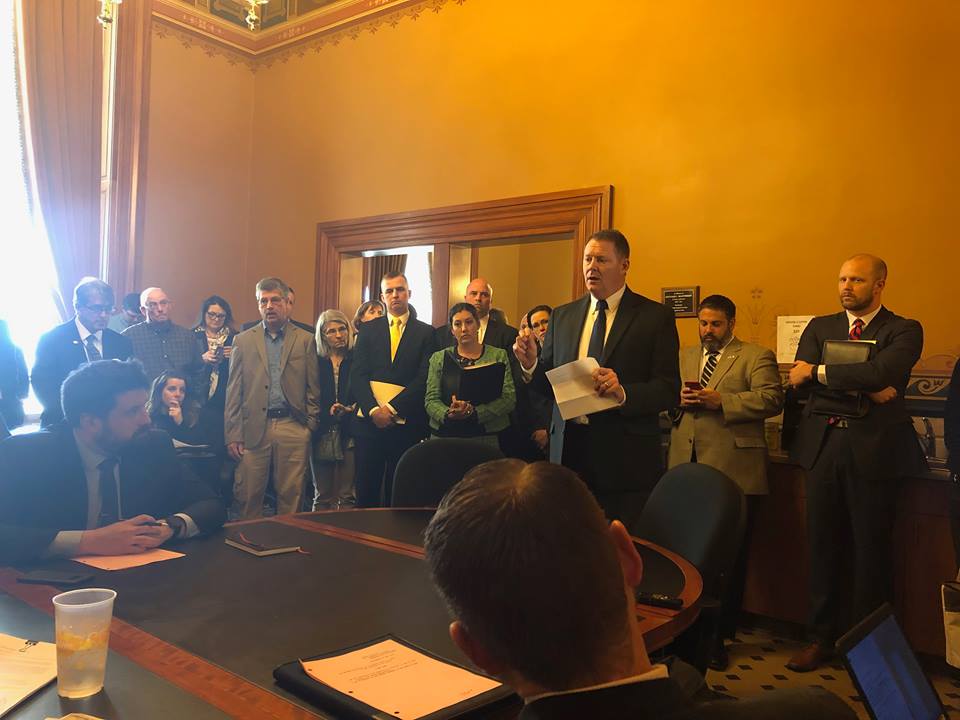A bill that would prohibit water pollution control projects from including the acquisition of real property by a private entity for future donation or sale to a political subdivision, the DNR or the federal government passed a House subcommittee passed through a House subcommittee on Tuesday. It also prohibits the use of moneys in the State Revolving Funds under the federal Clean Water Act or Safe Drinking Water Act for the financing, subsidizing or enabling of the acquisition of real property by a private entity.
The bill already passed through the Iowa Senate. Representative Mike Sexton (R-Rockwell City) said it is all about leveling the field for Iowa farmers.
“It creates a level playing field,” Sexton said. “It doesn’t give the Natural Heritage Foundation an advantage, which they have right now because they’re going to borrow money for 2 percent or less and the average farmer will have to borrow money for 5 or 6 percent depending on their financial capability.”
Sexton chaired the subcommittee, which was attended by about 40 people. He explained his expectations right away.
“This bill is very narrowly drafted,” Sexton said. “I’d like our comments to be directed specifically at the ability to borrow money from the state revolving fund. If your comments drift from that, because there are a lot of us here, I’m going to call you out. If everybody wants to talk, that’s fine, but we’re going to talk to the issue at hand.”
Patti Cale-Finnegan was the coordinator for the State Revolving Fund for 14 years. She said she helped originate the program, which allowed an organization like the Natural Heritage Foundation to partner with the Department of Natural Resources and county conservation boards and other fish and wildlife interest to purchase land, hold it and have it turned over to public ownership.
“These are farmers and other land owners who had a desire to sell land for the purpose of conservation,” Cale-Finnegan said. “I would argue it’s been a very effective tool for water quality and land conservation purposes.”
Mike Delaney, a volunteer lobbyist for the Izaak Walton League, said his group opposes the bill. He talked about his son selling some land to the Iowa Natural Heritage Foundation to protect the water way at Easter Lake.
Sexton asked if the NHF not being part of the SRF stops that from happening. Delaney acknowledged it would not.
The Iowa Farm Bureau supports the bill. It wants to ensure a level playing field for all Iowans wanting to purchase ground and ensure the state is not providing a competitive advantage for private organizations to compete against private citizens when seeking to acquire ground.
Fred Long of hte Iowa Conservation Alliance spoke against the bill.
“While (this bill) might not stop our work, it will add considerably to the cost of it,” he said. “If clean water is in the interest of all Iowans, and I believe it is, I think we should do whatever we can to keep those costs down.”
If the NHF cannot buy this land for the group, then the group will have to buy it and pay a higher interest rate, Long said.
Sexton pointed out that by getting a lower interest rate, it is putting farmers at a competitive disadvantage.
Joe McGovern is the president of the Iowa Natural Heritage Foundation. He said the bill has gotten considerably better since it started in the Senate.
“However, we have to be opposed to this bill,” McGovern said. “I do not believe this is a good bill for Iowans. I do not believe it’s a good bill to further our water quality initiatives around the state.”
McGovern said the purpose of the funds is not to out-compete a land owner.
“We are trying to further water quality protection,” he said.
The Iowa NHF has been using SRF for 12 years. They’ve done 54 land projects in 30 counties. In all, 11,086 acres have used SRF over those 12 years. The average price per acre is $4,418 of those projects. The average price of land is $7,264.
The loans come from private banks and typically include fees. The NHF uses local banks on local projects, he said.
“Everyone’s quality of life is enriched when we use SRF for these projects,” McGovern said.
He wants legislators to hit the pause button to educate themselves on what the bill actually does and what the intended and unintended consequences may be.
Banks have a choice to charge up to 2 percent interest. Sometimes it’s 0.25 percent. Other times it’s 0.5 percent. Those savings are passed on to the public partners.
Sexton read a letter from a family that is trying to help a 19-year-old start farming. He’d be a sixth generation Iowa farmer.
“Trying to help our son get started farming is a huge task,” the letter said.
The letter states that Iowa NHF is using SRF to finance land purchases. Iowa NRF is overbidding farmers who are trying to get a start.
“I’m pretty sure that wasn’t what the SRF was intended for,” the letter said. “That has been going on for many years and it’s time we do something about it. Senate File 548 addresses this very problem. The misuse of taxpayer dollars creates a huge competitive advantage over Iowa farmers like us.”
Two separate tracts were auctioned off by the same company. Both were owned by the same individual. The tracts were approximately 12-15 miles apart. The NHF bought one for $4,350 an acre. The other tract was never bid on by Iowa NHF and went for $2,575 an acre.
“The numbers don’t lie,” the letter said.
Sexton said that situation is an example for why Iowa farmers are upset.
“Here’s a young guy trying to get started and you guys pay $1,775 more per acre than a better piece of ground,” he said. “That’s why we’re upset.”
McGovern said they aren’t using SRF money for that project.
“Those are our dollars,” he said.
But, it would seem the group’s ability to use SRF dollars on other projects then allows it to have more of its own money available for projects where it doesn’t use SRF dollars.
Sexton said if NHF wasn’t there, the price would’ve been significantly lower.
“With all due respect, that’s not true,” McGovern said. “We were not the only bidder.”
McGovern said projects using SRF dollars are very targeted and rare.
Dan Cohen is the executive director for the Buchanan County Conservation Board.
“The first question that should be asked is does Iowa Natural Heritage Foundation’s use of those funds help protect and enhance water quality,” he said. “If Iowa is serious about water quality and it is indeed a high priority, that question should be answered. If it’s yes, there’s really no reason to go further with this bill.”
After some conversation, McGovern and Sexton exchanged dialogue again. Sexton asked how many times Iowa NHF has been turned down through the SRF process. McGovern said that has never happened.
“We haven’t been turned down because we bring good projects,” McGovern said.
Jane Robinette of Urbandale is a member of the Iowa Natural Heritage Foundation. She opposes the legislation.
“I don’t know why you’d want to take a tool away that addresses water quality in the state,” she said. “We don’t seem to be making a lot of progress on that generally.”
Robinette asked how many people at the subcommittee were there to oppose the legislation. Based on the show of hands, the overwhelming majority of folks were there to oppose the legislation.
Of course, considering the bill is aimed at leveling the playing field for farmers, those who support the legislation were likely busy working.
Representative Ras Smith (D-Waterloo) offered to stick around after the meeting if anyone wanted to share information with him.
“I think passion is good,” he said. “I’m not sure if an adversarial conversation is beneficial. From my perspective I don’t think there’s anything too nefarious going on on either side. I don’t support this legislation in its current from. I understand we have a narrow focus, but potential ramifications are broad and wide.”
Representative Jarad Klein (R-Keota) said he believes the conversation needs to be furthered. He encouraged people to continue to reach out with their comments and concerns.
“It needs more attention from the entire House,” he said. “Not just from three members.”
Sexton said he has a farm where he tests the water routinely. He checks the water before it runs through his property and when it runs off his property.
“I have done this for 10 years,” he said. “I’m not opposed to conservation. I’m not opposed to clean water. What I’m seeing in this bill is what I believe is a fairness issue. I don’t want to cuff anybody’s hands. I think the Natural Heritage Foundation has done a great job. I’m glad you’re in Iowa. I like your projects, but I personally believe you can still do what you do and we can still have a fair playing field with Iowa farmers. That’s why I think we need to look at it.”












